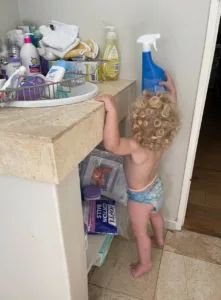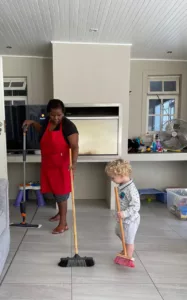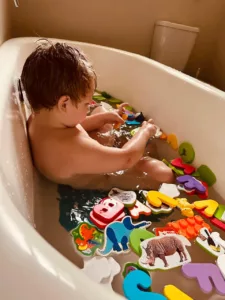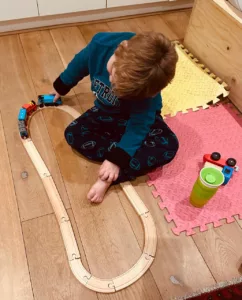When your child does home-based early intervention therapy, you lack a lot of privacy. Although we are incredibly fortunate to be able to afford the excellent services Aidan receives thanks to his grandparents, we are managing a lot of people in a busy household on a daily basis. Don’t get me wrong, we are incredibly grateful for Aidan’s team! And for the fantastic opportunity he has to be supported by such amazing people. But having a lot of people in a small space has definitely affected the dynamics at home.
For instance, we are not able to freely discuss our thoughts on Aidan’s therapy, program, or service provider, because there are always listening ears around. We’re not able to work through marital disagreements or have all-out arguments in front of staff. And I always struggle to find an empty room with a closed door to have my own therapy sessions in private. You may not think it a hardship, given our enormous privileges, and we don’t consider it one either. But it has forced my husband Monty and me, to do a lot of communicating via WhatsApp.
At first I found this incredibly frustrating! And I sometimes still do, because my husband games on his phone, and doesn’t always check his WhatsApp messages. But as time has gone on, we’ve settled into this being our main form of communication during the day. We will text each other for help if one of us is changing what turns out to be a blowout diaper, and Aidan is trying to get his hands into the mess, or is having behaviours on the changing table. We do this because if you start shouting for the other to come and help, Aidan becomes upset and massively escalates. We also carry our phones in our pockets at all times, because when Aidan’s mood is low, you can get stuck in a particular part of the house with him because he won’t go with you and he won’t let you walk away from him either. So if this happens, and I need to pee or crack on with something, I text Monty to come and take over from me. This system generally works well for us because Aidan will normally accept an exchange of one parent for the other (unless he’s sick, in which case he only wants me), and it tends to curb extra and unnecessary meltdowns. We use WhatsApp a lot when Aidan is having a bad day or night, and respond to each other’s messages as soon as we read them.
I also regularly WhatsApp with Aidan’s therapist. Because despite being under the same roof, I try to keep out of the way of his exercises around the house, because seeing mummy can be a big distraction from the work he’s focused on doing. So, instead of chatting to me in person, his therapist might text me to ask permission to use something or go somewhere with him, or she might prompt me to change his diaper, or let me know what has triggered a particularly serious meltdown. It allows me to appear in person when needed, and calms my fears around occasional adverse behaviours on his program. I’ve encouraged this type of exchange and discussion, because when Aidan is in his “classroom” (our spare bedroom, converted into a therapy space), we can’t see what has triggered him, and can only hear that things are kicking off. We don’t really ever know if we should be worried or not, unless his therapist communicates well with us. It’s been a bit of a struggle of constant reminders to keep this critical information flowing between us all. But his current therapist is great at sending regular WhatsApp’s, and also gives us a thorough debrief at the end of each day – which we hugely appreciate.
We have two Aidan-focused WhatsApp groups. One includes everyone, including the current ABA therapist, and the other is just Monty and me and his au pair. We regularly make judgment calls about who needs to know what, but generally most everything is shared in the bigger group. Every Sunday, I post the weather report for the upcoming week so that outfits and outings can be planned around inclement weather. And I also send reminders to everyone about upcoming appointments or specific planned activities. All health and sleep updates are shared too, because Aidan’s wellness and energy levels affect his learning tremendously. I think it’s entirely fair to say that most of my days, nights, thoughts, and communications, revolve fully around my son! And I feel that that’s how it should be for now. We are making the most of our “Window of Opportunity” for great learning between the ages of two and four, and I will likely be all-consumed with my son’s care for a long time to come. All I can say is, thank God for WhatsApp! I’m not sure how my marriage, this house, or Aidan’s program, would run without it!







